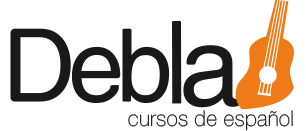FAQs
ABOUT THE CITY
Yes, we offer transfer service to and from the airport.
ABOUT THE SCHOOL
ABOUT THE COURSES
The lesson times: – Intensive Spanish course times are as follows: 09:00 – 13:00 or 15:00 – 19:00 (schedules are subject to change) – Superintensive Spanish course times are as follows: 09:00 – 15:00 or 14:00 – 20:00 (schedules are subject to change).
Our Spanish language courses begin every Monday except A1 course.
Tuition is included in the price. The cost of each book is 30€.
Yes you can, but your parents or legal representatives should sign an authorization before the course. The minimum age is 16 years
The minimum age is 16 years old.
ABOUT THE ACCOMMODATION
Visa
OBJECTIVES OF THE CCP BY LEVEL AND LEARNER PROFILE
The PCIC (Curricular Plan of the Cervantes Institute) establishes objectives for learning Spanish as a foreign language at different levels according to the CEFR (Common European Framework of Reference for Languages). For all levels, specific goals are set according to the three learner profiles:
Level A1
Learner profile | Main objectives (A1) |
🧑🤝🧑 Social agent | – Can understand and use basic everyday expressions. |
🎓 Independent learner | – Uses basic strategies for learning (repetition, association). |
🌍Intercultural speaker | – Recognises basic customs of the Hispanic world (greetings, meals, timetables). |
Level A2
Learner profile | Main objectives |
🧑🤝🧑 Social agent | – Can understand sentences and frequently used expressions related to areas of most immediate relevance (personal information, shopping, environment). |
🎓 Independent learner | – Applies basic study skills such as note-taking, underlining and outlining. |
🌍 Intercultural speaker | – Can recognise basic differences in social customs and cultural expressions. |
Level B1
Learner profile | Main objectives |
🧑🤝🧑 Social agent | – Can deal with most situations likely to arise whilst travelling. |
🎓 Independent learner | – Plans his/her learning with greater autonomy. – Can select effective strategies to extend vocabulary and grammar. – Reflects on errors and actively seeks solutions. |
| 🌍 Intercultural speaker | – Participates in conversations taking into account the cultural perspective of the interlocutor. – Recognises more complex social norms (register, humour, cultural gestures). – Can adapt his/her behaviour to different basic intercultural situations. |
Level B2
Learner profile | Main objectives |
🧑🤝🧑 Social agent | – Can understand the main ideas of complex concrete and abstract texts. |
🎓 Independent learner | – Critically evaluates learning materials and selects appropriate ones. |
🌍 Intercultural speaker | – Understands values and beliefs underlying cultural behaviour. |
Level C1
Learner profile | Main objectives |
🧑🤝🧑 Social agent | – Can express him/herself fluently and spontaneously without obvious effort. |
🎓 Independent learner | – Can accurately self-assess his/her level and progress. |
🌍 Intercultural speaker | – Critically analyses cultural differences and communicates with intercultural competence. |
Contents
Contents of the PCIC by levels and learner profiles
Level A1
Learner profile | Main contents |
🧑🤝🧑 Social agent | – Basic vocabulary about everyday life (greetings, family, meals). |
🎓 Independent learner | – Strategies for memorising vocabulary. |
🌍 Intercultural speaker | – Forms of greetings and farewells in the Hispanic world. |
Level A2
Learner profile | Main contents |
🧑🤝🧑 Social agent | – Extended vocabulary (leisure, health, short trips). |
🎓 Independent learner | – Techniques for organising content (lists, diagrams). |
🌍 Intercultural speaker | – Rules of politeness in different Spanish-speaking countries. |
Level B1
Learner profile | Main contents |
🧑🤝🧑 Social agent | – Expansion of vocabulary on current affairs, work, environment. |
🎓 Independent learner | – Note-taking techniques and use of digital resources (blogs, podcasts). |
🌍 Intercultural speaker | – Analysis of cultural stereotypes. |
Level B2
Learner profile | Main contents |
🧑🤝🧑 Social agent | – Abstract and specific vocabulary (technology, politics, art). |
🎓 Independent learner | – Critical evaluation of information sources. |
🌍 Intercultural speaker | – Study of non-verbal cultural behaviours. |
Level C1
Learner profile | Main contents |
🧑🤝🧑 Social agent | – Specialised and nuanced vocabulary according to context. |
🎓 Independent learner | – Autonomous management of learning or research projects. |
🌍 Intercultural speaker | – Critical reflection on cultural clashes. |
